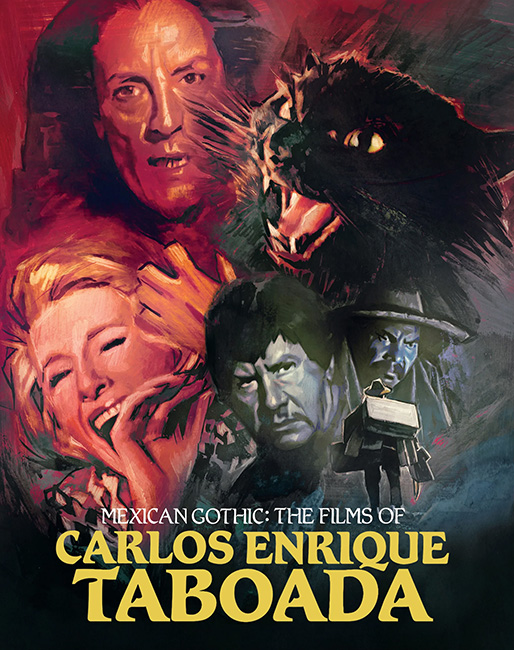I am so happy to see that more and more Mexican horror cinema is hitting the format known as Bluish Laser Beam Diskette AKA Blu-ray. When I can look at my shelves and see titles like Rubén Galindo Jr.’s Cemetery of Terror (1985) and Don’t Panic (1987) sitting there, it fills my heart with a spooky joy and my mind with a cackling madness. But stepping away from the wilder and goofier side of things, Vinegar Syndrome brings a trilogy of films that are much more serious from Carlos Enrique Toboada, a masterful Mexican filmmaker.
First up is a gothic horror classic, Darker than the Night (1975). This one is about Ofelia (Claudia Islas), a plucky gal who inherits a large mansion from an estranged aunt after her passing. The only hitch in this surprising windfall of property is that Ofelia has to take care of her aunt’s black cat for the rest of its natural life. Sounds easy, right? Ofelia makes the rookie mistake of bringing her cat-hating roommates to come and stay at the mansion with her. After the cat frickin’ drops dead due to her idiot friends’ negligence, they start getting picked off one by one by a ghostly presence. Good! Frickin’ morons.
Poison for the Fairies (1986) is the heartwarming story of two schoolgirl pals that made me so darned angry that I (did not) literally burst into flames. Verónica (Ana Patricia Rojo) is the class liar who manages to convince Flavia, the new kid in school, that she is a witch. This would be hilarious sitcom stuff if the stakes in Verónica’s little games didn’t keep escalating. To say any more would do the film a disservice, because it is just so smart and harrowing. Taboada received two Ariel Awards for Poison for the Fairies and the success freaked him out so much, he took several years off from directing.
My strong distaste for killer kid movies isn’t just because they all seem to hinge on the lil baddies lying to adults while wearing a mask of doe-eyed innocence, and bullying some other kids their age or whatever. It’s mainly that the writing and performances are often so good that I end up getting really upset before the movie is over. I guess I just have a low tolerance for watching folks undergo gaslighting from some garbage mini-humans. My blood pressure needs to stay low, y’all.
Last in the trilogy of Taboada films on this set is Rapiña (1975), a tale of two poor lumberjacks who strike it rich by looting corpses at the site of a plane crash. Veteran actors, Ignacio López Tarso and Germán Robles, are excellent in their roles as the two men who are so poor that even the smallest amount of money could change their lives. Unfortunately, their ill-gotten gain poisons their relationship and shit goes very badly for them and their long-suffering wives. This movie teaches the lesson that you should be happy with what you have because money sucks and people suck and everything sucks.
Writer/director Carlos Enrique Taboada was a supremely talented dude, but I think he was not the most optimistic bro. If you’re looking for a trio of films to restore your faith in humanity, then you are in big, big trouble. I have only ever seen four Taboada’s films and all of them have a deep, dark cynical streak to them. Maybe that’s your kink (and I ain’t shamin’), but I am going to go back to my naïve little corner of this Word document. Mexican horror fans take note that while Darker than the Night and Poison for the Fairies count as horror films, Rapiña is a dark drama. That being said, all modern horror films are just dark dramas with either demon possession or ghost subplots anyway. But I won’t get into that now.
Vinegar Syndrome did that thing again when they have a disclaimer about the film elements being damaged blah blah blah. It’s true that all three films have a little damage to them in places, but nothing so distracting that it kept me from enjoying these films that made me scared to go outside or talk to people (more than I already am). Film scholar Valeria Villegas gives each film its own video essay on the second disc. They are all excellent in that they are filled with trivia and her analyses are engrossing and very interesting.

